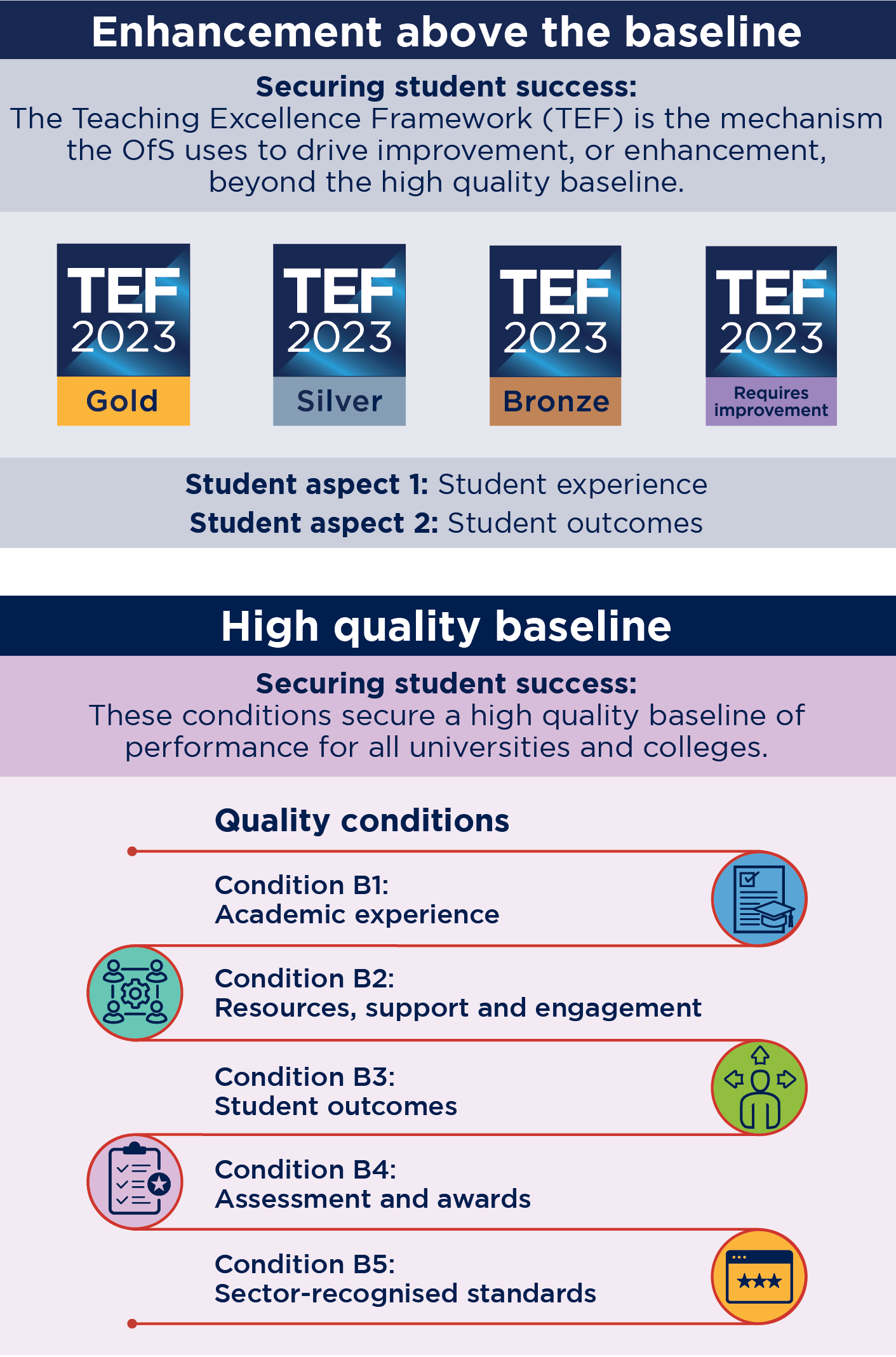How we regulate quality and standards
It is important that English higher education delivers a high quality academic experience for all students and that qualifications awarded are credible.
This means that providers need to meet our requirements for the quality and standards of the courses they offer.
What requirements do providers need to meet?
To stay registered with the Office for Students, the quality and standards of a higher education provider's courses must meet a minimum set of requirements or conditions.
When a provider first registers with the OfS, it is assessed to make sure it meets these conditions. The initial conditions of registration for quality and standards are:
For providers who are seeking registration but may not yet have delivered higher education.
The provider must have credible plans to enable them to comply with conditions B1, B2 and B4 and the capacity and resources necessary to deliver those plans.
For providers who are seeking registration but may not yet have delivered higher education.
The provider must demonstrate that any standards they follow in awarding qualifications must follow the recognised sector standards.
Once registered, we monitor the provider to make sure it meets these conditions on an ongoing basis.
The ongoing conditions of registration for quality and standards are:
Condition B1: Academic experience
The provider must ensure that the students registered on each higher education course receive a high quality academic experience. A high quality academic experience includes but is not limited to ensuring that each course:
- is up-to-date;
- provides educational challenge;
- is coherent;
- is effectively delivered; and
- as appropriate to the subject matter of the course, requires students to develop relevant skills.
Condition B2: Resources, support and student engagement
The provider must take all reasonable steps to ensure:
- students receive resources and support to ensure:
a. a high quality academic experience for those students; and
b. those students succeed in and beyond higher education; and - effective engagement with each cohort of students to ensure:
a. a high quality academic experience for those students; and
b. those students succeed in and beyond higher education.
Condition B3: Student outcomes
Providers must deliver positive outcomes for students on their higher education courses.
Condition B4: Assessment and awards
The provider must ensure that:
- students are assessed effectively;
- each assessment is valid and reliable;
- academic regulations are designed to ensure that relevant awards are credible;
- academic regulations are designed to ensure the effective assessment of technical proficiency in the English language in a way which appropriately reflects the level and content of the course; and
- relevant awards granted to students are credible at the point of being granted and when compared to those granted previously.
Condition B5: Sector-recognised standards
The provider must ensure that, in respect of any relevant awards granted to students who complete a higher education course provided by, or on behalf of, the provider (whether or not the provider is the awarding body):
- any standards set appropriately reflect any applicable sector-recognised standards; and
- awards are only granted to students whose knowledge and skills appropriately reflect any applicable sector-recognised standards.
The regulatory framework contains these conditions in full, and guidance to help providers understand how the OfS may interpret them.
High quality baseline
These conditions secure a high quality baseline of performance for all universities and colleges. This means that all students – whether they come from the UK or overseas – can expect a high quality course and successful outcomes.
Our regulation in this area covers the quality of courses delivered to students studying overseas, at an OfS-registered provider’s overseas campus or at an overseas provider delivering courses on behalf of a provider registered with the OfS.
Conditions of registration impose legally binding requirements on a university and the OfS takes a risk-based approach to monitoring compliance with them.
Where the OfS is concerned that risk may have increased for a particular university or college, it can, and does, take action to establish whether it is at risk or has breached a condition.
If a breach or risk of breach is identified, the OfS can require a provider to take action to remedy this and impose a sanction.
Improvement above the baseline
The Teaching Excellence Framework (TEF) is the mechanism the OfS uses to incentivise improvement, or excellence, beyond the high quality baseline. Participation in the TEF is set out in Condition B6: Participation in the TEF:
The provider must participate in the Teaching Excellence Framework (TEF).
Universities and colleges with more than 500 undergraduate students are required to participate in the TEF. Other universities and colleges can take part voluntarily.
The TEF has the following features:
- a cyclical assessment process which takes place every four years
- universities and colleges make a submission, as do their students if they wish
- judgements are made by an expert panel of academic and student members
- the OfS publishes, for each participating university or college, the panel’s ratings and reasoning.
- The OfS’s approach to baseline and above baseline regulation is summarised in this diagram:

Contact us
For more information or queries about quality and standards email [email protected].
Last updated 25 September 2024 + show all updates
24 September 2024 - We have made some changes to the guide, to include details of our approach to quality assessment and the different types of assessment we undertake.
03 October 2022 - Wording added to reflect that Condition B3 came into effect on 3 Oct 2022.
01 May 2022 - Changes to the conditions of registration that relate to quality and standards are now in effect
02 March 2022 - Update on changes to the conditions of registration that relate to quality and standards
20 July 2021 - Changes to reflect the launch of the consultation on quality and standards conditions.
26 January 2021 - Copy updated to reflect consultation being closed
15 January 2021 - Consultation deadline extended
Describe your experience of using this website
